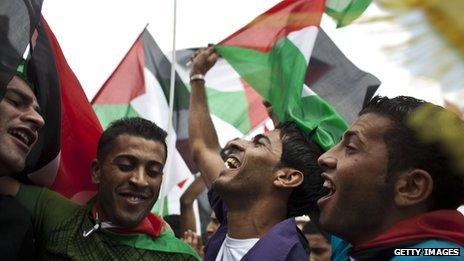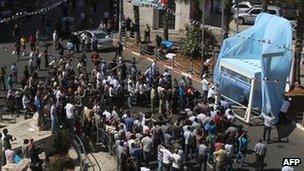Faded hopes of Palestinian place at UN
- Published

A year ago on a warm September evening in Ramallah, Palestinians were dancing in the streets.
Car horns blared as people craned out of their sunroofs waving red, black, green and white Palestinian flags.
The crowds had just watched President Mahmoud Abbas, live on a giant screen from New York, as he told the United Nations he was heading to the Security Council to ask for Palestine to be admitted as a member state.
Although the move was unlikely to change facts on the ground for Palestinians, or end Israel's occupation, Mr Abbas saw it as a way of putting diplomatic pressure on the Israeli government.
A loud cheer went up as the president brandished his formal application papers in front of the UN delegates.
In nearby Manara Square, the Piccadilly Circus of this small West Bank town, a huge blue wooden chair had been erected, 8 or 9 metres (26-30ft) high to symbolise the UN seat the Palestinians were seeking.
For a few months afterwards it provided a novelty, or some would say an eyesore, for passing shoppers.

The chair in a Ramallah that was once a symbol of hope
But midway through the winter, the chair collapsed during a sudden storm.
The analogy with the Palestinian UN bid is not hard to make.
The bid came to nothing, blocked largely by diplomatic pressure from the United States, Israel's strongest ally.
The US had threatened to use its veto power in the Security Council if necessary.
It never got to that stage.
We have heard relatively little of the Palestinians since.
'Blackmail'
"Latest developments whether they be global or regional have led to the marginalisation and sidelining of the Palestinian question," says Dr Hanan Ashrawi, a senior figure in the political leadership in the West Bank
Dr Ashrawi, a member of the Palestine Liberation Organisation's Executive Committee, says the Palestinian issue has been squeezed out of the news by bigger global headlines.
"The Arab Spring is one. Then there is the financial crisis, and thirdly there is the American Presidential election. The whole world has to be put on hold. Nobody can do anything that would affect the candidates' chances of re-election or election. All these things have led to our dematerialisation."
Dr Ashrawi says President Abbas has been put under massive pressure by the US administration to keep quiet before the US election and not to make another attempt to upgrade Palestine's UN state this year
"Blackmail is how I'd put it impolitely," says Dr Ashrawi.
"I don't know what else to call it when you are told Congress will suspend all funding for the Palestinians, suspend all relations with us and close our representative's office in Washington."
Dr Ashrawi says the Palestinians will at some point go the UN General Assembly, where the US does not have veto power, and take the less ambitious step of seeking to become a non-member observer state.
But she says no decision has been taken as to when this will happen.
Over the past year little has moved for the Palestinians.
Fresh elections, long overdue, never happened and despite many promises the two rival Palestinian factions Fatah and Hamas failed to patch up their differences and are still bitterly divided.
President Abbas's Fatah faction is in power in the West Bank. Hamas governs in Gaza.
If and when Mr Abbas does renew his UN bid, he would not be speaking for all Palestinians. Hamas says going to the UN is a waste of time.
Boycott calls
Over the last 12 months things seem to have just muddled along.
President Abbas received a standing ovation as he announced his application to the UN
Some are pointing the finger of blame.
"There is no Palestinian leadership," says Omar Barghouti, a Palestinian activist in the West Bank.
"The current so-called leaders are unelected, unaccountable democratically. None of them have a democratic mandate, neither in the West Bank nor in Gaza. There is a complete vacuum in leadership."
Mr Barghouti is part of movement called BDS which calls for Boycott, Divestment and Sanctions as a way of putting pressure on Israel to end its occupation.
The movement often cites the boycott of apartheid South Africa during the 1980s as an inspiration.
Mr Barghouti gave up on President Abbas's goal of a two-state solution, a Palestinian state side-by-side with Israel, a long time ago.
He aspires for one state with equal rights.
"I have endorsed the one-state solution. I have always believed that a secular, democratic state is the most ethical, sustainable and legitimate solution to this colonial conflict. What worked in South Africa can work here with some differences."
Mr Barghouti points out that this is his personal view and that BDS as a movement does not hold a position on whether a one-s or two-state solution is more desirable.
He believes the boycott movement, which is strongly opposed by Israel, has grown in recent years in spite of the Palestinian political leadership rather than because of it.
'Last legs'
Over the past year there have been some small protests against President Abbas when people thought he was looking to try and renew peace negotiations with Israel.
Many Palestinians have become utterly disillusioned with peace talks, a process Mr Abbas has been part of for decades.
There have also been demonstrations against his government's handling of the Palestinian economy, which is still massively dependent on foreign aid.
Some believe the 76-year-old president has reached the end of the political road.
"He should go today. In fact he should have gone yesterday," says Omar Shabban, a political analyst and economist at the Gaza-based think-tank Palthink.
"The Americans did not give him anything, Israel did not give him anything and they will not give him anything."
But few people here, including Mr Shabban, can tell you who or what might come after President Abbas.
"There is a big hole. The gap between the leadership and the people is getting bigger and bigger. The leadership is no longer on people's consciousness."
He says President Abbas's biggest failure has been not managing to achieve Palestinian unity between Fatah and Hamas.
But Dr Hanan Ashrawi denies there has been a failure of Palestinian leadership.
"It may be perceived as a failure, but the real failure is that there is a Palestinian leadership that is entirely powerless. It has no power but has been given all the responsibilities. Israel is acting like an occupying power with all the authority."
President Abbas's move at the UN last year was perceived by many to be a product of Palestinian frustration that decades of negotiation with Israel has failed to achieve a Palestinian state.
US-led Middle East peace talks which collapsed in 2010 over the issue of Israeli settlement expansion remain totally grounded.
More and more Palestinians and Israelis will tell you that the two-state solution is finished.
I ask Dr Ashrawi if she feels the same.
After a long pause, she sighs. "It would be extremely unfortunate if that were the case. But I think it's on its last legs, yes."
- Published14 August 2012
- Published24 September 2011
- Published24 September 2011